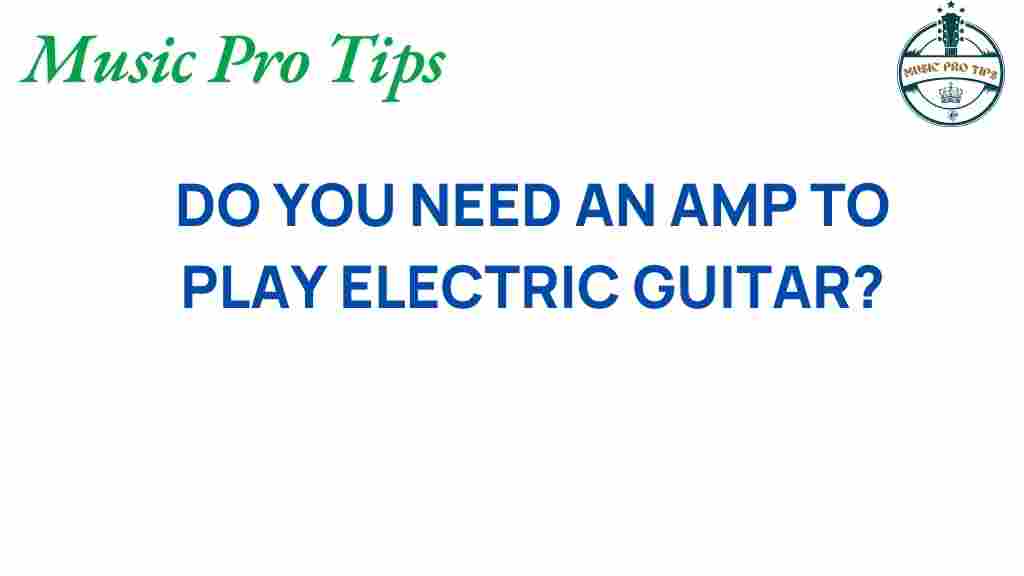The Shocking Truth: Do You Really Need an Amp for Electric Guitar?
When diving into the world of electric guitar, many beginners often contemplate one pressing question: do you really need an amplifier? This query is not just about the gear; it’s about sound quality, guitar tone, performance, and how best to express your musical ideas. In this article, we will explore the relationship between electric guitars and amplifiers, discuss the sound options available, and provide performance tips for both beginners and seasoned players.
Understanding Electric Guitars and Amplifiers
Electric guitars are remarkable instruments that rely on electrical signals to produce sound. This is where amplifiers come into play. An amplifier boosts the electrical signals from your guitar, transforming them into sound waves that can fill a room. Without an amplifier, the guitar’s sound is significantly muted and lacks the punch that many musicians desire.
Why You Might Think You Don’t Need an Amp
With the advancement of music technology, some players question the necessity of an amplifier. Here are a few reasons why you might think you can skip the amp:
- Headphone Amps: These compact devices allow you to play quietly while still hearing a robust guitar tone.
- Modeling Software: Digital audio workstations (DAWs) and software plugins can imitate the sound of various amplifiers and effects.
- Practice Amplifiers: Small practice amps can be convenient but might not provide the full range of sound options that larger amps do.
The Importance of Sound Quality
Sound quality is a vital aspect of any musician’s performance. While alternatives like headphone amps or software can be convenient, they often lack the richness and depth that a traditional amplifier provides. Here’s why amplifiers are essential for achieving superior sound quality:
- Dynamic Range: Amps can deliver a more dynamic range, enhancing your guitar tone and making your performance more engaging.
- Effects Processing: Many amplifiers come with built-in effects, enriching your sound with reverb, delay, and distortion.
- Speaker Interaction: The interaction between the guitar and the amp’s speaker contributes to a unique tonal character.
Choosing the Right Amplifier
When selecting an amplifier, consider the following factors:
- Type of Amp: Different types of amplifiers include tube, solid-state, and hybrid. Each has its own characteristics and effects on sound quality.
- Power Rating: Depending on where you plan to perform, you’ll need an amp with adequate power. Smaller venues may require less wattage.
- Portability: If you plan to gig, consider the weight and size of the amp.
Exploring Sound Options
Electric guitars paired with the right amplifier open up a world of sound options. Here are some common amp settings and their effects on guitar tone:
- Clean Tone: Ideal for jazz and pop, a clean setting produces a bright and clear sound.
- Overdrive: This setting adds warmth and grit, perfect for rock and blues styles.
- Distortion: Common in heavy metal, distortion creates a powerful, aggressive sound.
Performance Tips for Beginners
If you’re a beginner guitarist, here are some performance tips to help you make the most of your electric guitar and amplifier:
- Experiment with Settings: Don’t be afraid to adjust the amp’s settings to find your unique sound.
- Practice Regularly: Consistent practice helps you become more familiar with your gear and improves your technique.
- Play with Other Musicians: Jamming with others can help you understand how your sound fits into a larger musical context.
Understanding Music Theory
For electric guitarists, a basic understanding of music theory can enhance your playing. Here’s how:
- Scales: Knowing scales helps you improvise and create solos that complement your guitar tone.
- Chords: Understanding chord progressions will improve your songwriting skills and performance versatility.
- Rhythm: A grasp of rhythm is essential for timing and playing in sync with other instruments.
Troubleshooting Common Issues
Even with the best equipment, issues can arise. Here are some common problems and how to troubleshoot them:
- Low Volume: Check your guitar’s volume settings and ensure the amp is powered on.
- Distorted Sound: If the sound is overly distorted, try lowering the gain or checking the connections.
- Unwanted Noise: This could be due to interference; try repositioning your amp or using a noise gate.
Conclusion: The Verdict on Amplifiers
So, do you really need an amp for your electric guitar? The answer is a resounding yes, especially if you’re keen on achieving high sound quality and a rich guitar tone. While alternatives exist, nothing quite compares to the full experience of playing through an amplifier. For those just starting on their musical journey, investing in a good amplifier can significantly enhance your learning and performance.
Remember, whether you are a beginner or a seasoned guitarist, your gear plays a crucial role in your musical expression. Explore the sound options available to you, apply the performance tips discussed, and don’t hesitate to delve into music theory to enrich your playing.
For more insights on music equipment and performance, check out this resource. Happy playing!
This article is in the category Sound and created by MusicProTips Team
